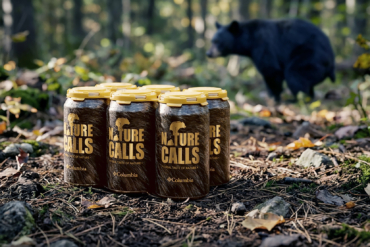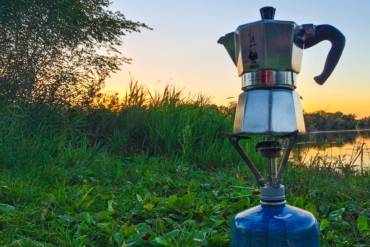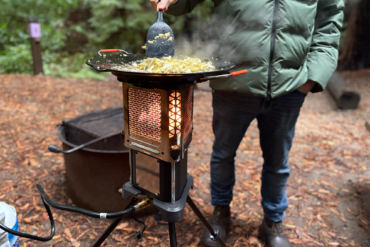Igloo launched a pulp-based cooler this month. Its sturdy build, $10 price tag, and biodegradable nature could disrupt the one-time-use market currently dominated by EPS and Styrofoam.
Last fall, a product developer at Igloo took a shovel to the dirt in her backyard. She dug a large hole and tossed a cooler inside, burying a prototype product the brand touts could be its most important development in years.

Three months later, the developer dug the cooler up. “It was falling apart,” said Brad Blankinship, a vice president at Igloo and a co-inventor of the RECOOL line. “It would be decomposed in a matter of weeks.”
Introducing An Eco Cooler
As eco stories go, the RECOOL’s is pretty simple. The pulp-based coolers, which come to market this month, are a sustainable alternative to one-time-use foam coolers sold in grocery stores and gas stations across the country.
The RECOOL is inexpensive, thermally insulating, and waterproof. It’s sturdy enough to tote a day’s worth of food, ice, or beer. Its material cannot crack like foam, and the RECOOL doesn’t squeak when you fasten the lid.
Throw a foam cooler away and it’ll be in a landfill for thousands of years. Worse, if not disposed of properly, foam can clog up waterways, where it floats as both ecological and aesthetic pollution.

Fish and animals ingest foam, the synthetic bits pervasive in ecosystems around the world. The RECOOL’s recycled pulp material breaks down as inert, natural mass.
For $10, RECOOLs are disposable, sometimes even one-time-use. But you can dry a RECOOL after a day’s use and, if not abused, employ it up to a dozen more times before the compost bin calls.
Styrofoam & EPS Coolers
Igloo’s competition comes from companies like Lifoam. For 50 years, Lifoam has made EPS (expanded polystyrene) coolers. They are cheap. People often purchase them at the last minute when in a pinch for an insulating case.
Today, Lifoam is a part of Newell Brands, which owns outdoor gear company Coleman as well as household brands like Rubbermaid, Diamond Match Company, Sharpie, and Mr. Coffee.
Models like the Lifoam Huskee Hercules have 1.5-inch walls and 2-inch corners. They are made for camping, tailgating, and hunting, according to Walmart, which sells the model for about $13. The smaller 24-Can Nested Cooler, with reinforced corners and a “ribbed” bottom, costs around $3.

Lifoam touts its coolers as recyclable. However, many cities have banned EPS foam and many municipal recycling facilities do not accept the material. It most often ends up in landfills.
Polluting the environment is another common end game for one-time-use and discarded EPS. With a fragile composition and airy form, it cracks and can blow off in particles and chunks. Igloo showed me visuals of clogged waterways and animals struggling to swim in foam-choked habitats.
A note on the nomenclature: Styrofoam is a trademarked type of closed-cell extruded polystyrene foam made by Dow Chemical. But people often write the trademarked term in the lowercase and confuse it with EPS.
Be it extruded polystyrene from Dow or expanded polystyrene from a fast food restaurant, the public sees it all as “styrofoam” and increasingly wants nothing to do with the breakable waste.
RECOOL: A Better Eco Cooler
Last week, I traveled to Southern California, where Igloo opened a new office, to see the RECOOL at a launch event. Ice-filled pulp coolers offered cold drinks during the week. One night, at an area farm, the Ecology Center, I found a half-decomposed RECOOL in a compost bin.
Chickens skittered underfoot at the farm. A locally-grown dinner was served outdoors under strung lights. I interviewed Blankinship and RECOOL co-inventor Ben Soto, as well as Dave Allen, the company’s new CEO.
Igloo chose the farm as an event venue to amplify the RECOOL’s sustainability theme. The humble pulp case, Allen said, is a milestone for the company and a peek at the future of the brand.

Origins of Cooler Design
Igloo was founded in Texas in 1947. Its origin is in a metalworking shop, where the brand manufactured drink tanks for oil crews. For decades the brand grew, inventing the PlayMate and other iconic designs to make its insulating boxes nearly ubiquitous at picnic grounds and in the outdoors.
Today, Igloo employs 1,500 employees in a massive 1.8 million-square-foot facility in Katy, Texas. With more than 500 products sold at thousands of retailers, it’s the largest cooler manufacturer in the world.

The RECOOL’s origin was far away from the Katy scene. Its roots are in Southern California, where Soto and Blankinship worked in the bicycle helmet industry. The pair co-founded C-Preme and later sold the company to Bell.
Blankinship said he and Soto, as a team, are obsessed with finding what he calls the “white space” in an industry. “What has room for improvement, or what has not been done before,” he said.
“We would comb the aisles at mass retailers looking for ideas,” Soto said. “We kept coming around to coolers — there’s not a lot of excitement there, and also the Styrofoam coolers are just horrible.”
Cooler Inspiration
Coolers were never on the career plan. But inspiration struck one day when the pair wrapped an EPS foam box in a hard shell with graphics — much like a bike helmet. “We thought we could do something better than Styrofoam with an EPS option,” said Blankinship.
Over 2 years, Soto and Blankinship developed prototypes and brought to market a better disposable cooler product. The first iteration included hard plastic sides and EPS foam. “It was better than Styrofoam,” Soto said, “but it wasn’t disruptive enough.”
Instead, one day they picked up some packing material at a helmet plant. It was a pulp material, strong yet pliable, and it was 100 percent sustainable. As an added benefit, the material also insulated its contents and was waterproof.
Eco Cooler Comes to Market
Fast forward to 2018, when Igloo acquired Soto and Blankinship’s business. The plan was to debut the world’s first “eco-sensitive” cooler made from 100 percent biodegradable materials.
The company calls RECOOL an economical and environmentally conscious alternative to single-use foam coolers. Igloo makes the patent-pending design in Pennsylvania.

I tested it out for a couple of days in California. Indeed, the pulp cooler holds ice and keeps items cold — for many hours. Its rough exterior gives an organic vibe in sharp contrast to Styrofoam.
Manufacturing the coolers is “more art than science,” Blankinship said. He described the process as “almost like baking cookies,” with giant industrial blender machines mixing up a slurry of newspaper, cardboard, wax cups, and other recyclables.
The slurry is poured into a press, molded, and placed in a kiln to extract the water.
It’s a process that’s been around for decades. Similar pulp-based containers are used for flower pots, egg containers, and as packing material to cushion electronics and fragile items in transport.
Each manufacturer is different. The Igloo team found its supplier in Pennsylvania after a nationwide search. “Getting the cooler walls straight in the mold was a challenge,” noted CEO Dave Allen.
Igloo RECOOL Comes to Market
RECOOL will be available in REI stores nationwide starting May 1; it’s for sale online now. Thousands of other retail locations this year, from gas stations and grocery stores to bait shops where Styrofoam has long dominated the shelf, will carry the RECOOL.
The pulp cooler comes in a 16-quart size. Igloo plans for new sizes and types in 2020. The company touts it can retain ice for up to 12 hours, though we saw ice lasting much longer in the spring temps last week.
It’s sturdy, able to hold up to 75 pounds. You can even stand on an overturned RECOOL — which we did. Its structure supported the weight of a grown man, though the company does not endorse this durability test.
RECOOL is a simple product but a smart disruption in its space. It strikes at an appropriate time, too — municipalities across America are banning the sale of foam containers, including disposable coolers. The tide is turning, and Igloo is on the front of an eco move that just makes sense.
Check out the RECOOL when you can. Put in some ice, drinks, and anything to eat. Use it a few times then drop it in the bin. The materials will dissolve, degrade, and return to the elements, with little harm done along the way.
See more info on the RECOOL on IglooCoolers.com, or buy one at REI.








